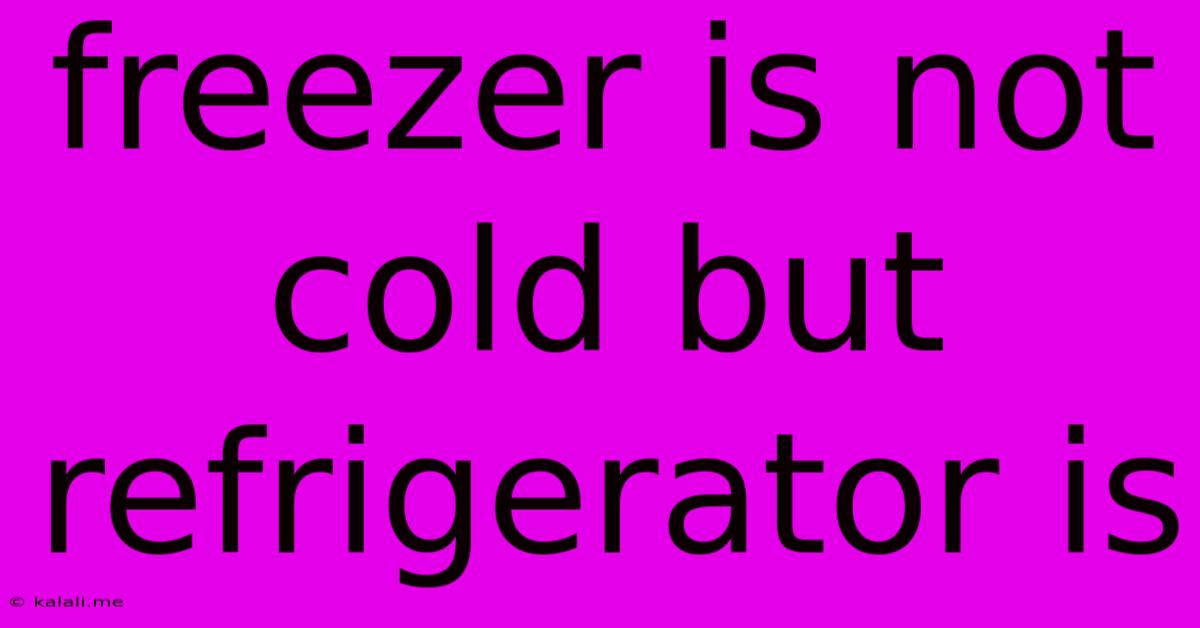Freezer Is Not Cold But Refrigerator Is
Kalali
May 26, 2025 · 3 min read

Table of Contents
Freezer Not Cold But Refrigerator Is: Troubleshooting Tips
Is your refrigerator humming along happily, keeping your fresh produce crisp, while your freezer stubbornly refuses to freeze? This frustrating problem is more common than you might think, and thankfully, often solvable without calling a pricey repairman. This guide will walk you through troubleshooting why your freezer is not cold but your refrigerator is, covering potential causes and solutions. This could be due to a variety of issues, from simple fixes like a faulty door seal to more complex problems requiring professional attention.
Common Causes and Solutions:
Here's a breakdown of the most frequent culprits behind a warm freezer and a functioning refrigerator:
1. Freezer Door Seal Issues
A damaged or poorly sealing freezer door is a prime suspect. Warm air leaking in constantly prevents the freezer from reaching its optimal temperature.
- Check for damage: Inspect the rubber gasket around the freezer door for cracks, tears, or significant wear. A simple visual inspection can reveal if the seal needs replacing.
- Test the seal: Close the freezer door on a piece of paper, pulling it gently. If the paper slides out easily, the seal needs attention. Cleaning the seal with warm, soapy water can sometimes improve its performance temporarily. If the issue persists, replacement is usually necessary.
- Adjust the door alignment: Sometimes, the door might be slightly misaligned, preventing a proper seal. Check the hinges and adjust them if needed.
2. Faulty Fan Motor
Freezers often utilize a fan motor to circulate cold air. A malfunctioning fan prevents even cooling throughout the freezer compartment.
- Listen for the fan: Is the fan running? A quiet or non-functional fan points to a potential problem. Sometimes, a simple cleaning of the fan blades can resolve the issue if they're clogged with frost or debris. If the fan isn't running, it might require replacement.
3. Defrost Issues
Excessive frost buildup can significantly hinder cooling efficiency.
- Check for frost: A heavily frosted freezer requires defrosting. Turn off the freezer, unplug it, and allow it to defrost completely. Remember to remove any excess water carefully.
- Inspect the defrost system: If frost buildup is a recurring problem, the defrost system itself (heating element or defrost timer) may be malfunctioning. This often requires professional repair.
4. Refrigerant Leaks
Low refrigerant levels are a more serious issue, affecting both freezer and refrigerator performance. Although your refrigerator is still working, the low level affects cooling capacity in the freezer compartment, which needs lower temperatures to work.
- This issue requires a professional: Refrigerant leaks require specialized tools and expertise to detect and repair. Attempting this yourself is dangerous and could void any warranty.
5. Temperature Control Issues
An incorrectly set thermostat or a faulty temperature control unit can result in an inadequately cold freezer.
- Check the thermostat setting: Ensure the freezer is set to the correct temperature. Many modern freezers have digital displays to accurately monitor and set temperatures.
- Check for malfunction: If the thermostat seems unresponsive or is displaying unusual behavior, it might be malfunctioning and require replacement.
6. Compressor Problems
The compressor is the heart of your refrigerator and freezer system. A failing compressor will lead to ineffective cooling.
- Listen for unusual sounds: Listen for unusual noises like loud humming, clicking, or grinding. These sounds often indicate compressor problems.
- Professional repair required: A faulty compressor typically requires professional repair or replacement.
When to Call a Professional
While many of the above issues are relatively straightforward to diagnose, some problems require the expertise of a qualified appliance repair technician. If you've tried the basic troubleshooting steps and the freezer remains warm, it's best to seek professional help to avoid further damage and ensure safety. Signs indicating you need a professional include:
- Persistent problems despite troubleshooting
- Unusual sounds coming from the refrigerator or freezer
- Suspected refrigerant leaks
By systematically addressing these potential causes, you'll be well on your way to restoring your freezer's icy chill while keeping your refrigerator efficiently cool. Remember, safety is key, so don't hesitate to call a professional if you're unsure about any repair.
Latest Posts
Latest Posts
-
Besttrace Doesnt Work On Alpine Linux
May 27, 2025
-
How To Say Following Up In Spanish
May 27, 2025
-
What Awg Wire For 30 Amp
May 27, 2025
-
Mcgonnagall Asking About Leaving Harry With Muggles
May 27, 2025
-
How Long Can You Keep A Fresh Turkey In Refrigerator
May 27, 2025
Related Post
Thank you for visiting our website which covers about Freezer Is Not Cold But Refrigerator Is . We hope the information provided has been useful to you. Feel free to contact us if you have any questions or need further assistance. See you next time and don't miss to bookmark.